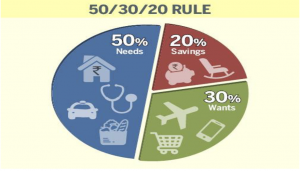
Lately there have been many queries regarding the apt amount to be put into investments. To be honest, there is no established amount to be invested which pays-off excellently. It is a PANDORA’S BOX which comes with its own variety of surprises and suggestions.
Let us begin with SECURITY, financial security we mean. Should you be a salaried person or a business owner, the market is a surprise for all, the first thing that haunts is financial security for future. For that the most important thing is balancing which is maintaining a balance across all aspects of finances so that nothing goes unexpected and out of order.
Easier said than done, how do we do that? Money Management or Budgeting is the answer!
As it may sound appalling but is not, it is simple mathematics to keep up with the cash flow at all times keeping in account the expenses, savings and emergency funds.
Talking of this brings us to our first and foremost action point:
Budgeting
Budgeting is the process of creating a plan to spend your money. This spending plan is called a budget. Creating this spending plan allows you to determine in advance whether you will have enough money to do the things you need to do or would like to do.
Why is Budgeting so Important?
Since budgeting allows you to create a spending plan for your money, it ensures that you will always have enough money for the things you need and the things that are important to you. Following a budget or spending plan will also keep you out of debt or help you work your way out of debt if you are currently in debt.
Speaking of that lets broadly divide your salary/earnings into three categories:
- Expenses
- Emergency Funds
- Savings
Expenses
This portion of the salary deals with expenses such as house-rent, conveyance charges, shopping and other miscellaneous expenses. Being one of the most critical components of your salary, investors often tend to equate this amount with salary. However, this approach is wrong.
An individual must try and keep a check on this amount and fix it. This helps in better planning and budgeting.
Emergency Fund
An emergency fund is nothing but a liquid fund that is readily available, should there be any exigencies. It is advisable that an individual saves 3-months of his/her salary in an emergency fund, which is parked in a high safety instrument, such as a fixed deposit or a liquid fund.
One of the benefits of having an emergency fund is that you don’t have to opt for a high-cost personal loan in case of an emergency. An important requirement is that an individual must have the financial discipline to not touch these funds until they actually face an emergency.
Investment
This is the most important component. In this component, you invest a fixed share of your salary in different assets to create a diversified portfolio. An individual should take this sincerely right from his/her early earning days. The sooner you start investing, the more the compounding effect increases.
Also, saving in merely fixed deposits, recurring deposits or other traditional instruments such as public provident fund would not help.
Balance the investment
Should you wish to strike off a perfect balance in your financials, there must be a proper discipline in your approach by which you seek to contribute to these components. You must also decide how much to invest and keep aside for the emergency fund.
50/20/30 Rule

The rule talks about dividing your earnings into:
Needs: this includes things like groceries, housing, utilities, car payment, health insurance and car insurance etc
Wants: this includes basic luxuries of life that you enjoy, like that unlimited text messaging plan, your home’s cable bill, and cosmetic repairs to your car.
Savings: this includes at least 20 percent of your after-tax income repaying debts and saving money in your emergency funds and retirement accounts.
Once you are done with the distribution, the next important question is where to invest, where that 20% should go?
Diversify your investments!
There are a large number of investment options available in the market. It depends on an investor’s requirement (defined by goal amount), duration of the investment and mainly, the risk appetite. An investor should look to diversify across asset classes and must add new instruments such as equities, mutual funds to his/her portfolio. This diversification enables an individual to accumulate wealth while efficiently managing tax and balancing their finances. Having an adequate diversification in a portfolio helps in risk diversification. The best types of investments are in diversified SIPs. Learn more about SIP Calculation on Piggy.
Start Investing!


 Make small investments for bigger returns.
Make small investments for bigger returns.

